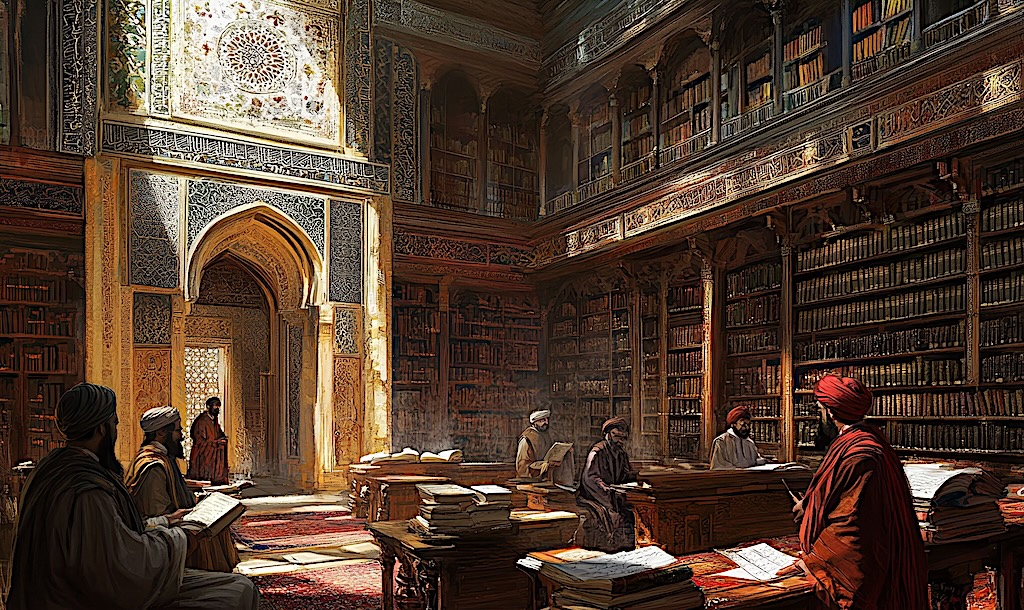During the Middle Ages, Arab and Muslim scholars played a crucial role in shaping human civilization and influencing Western culture. At a time when Europe was experiencing intellectual stagnation, Islamic civilization flourished, encouraging learning, scientific research, and the pursuit of knowledge. Muslim scholars absorbed the sciences and arts of the Greeks, Persians, and Indians, translated them into Arabic, and improved upon them. This intellectual activity created a vast body of knowledge that later became the foundation of the European Renaissance.
During the Golden Age of Islam, Arabic became the global language of science and civilization. Scholars wrote in various fields such as jurisprudence, medicine, philosophy, and astronomy, and produced groundbreaking works. They also translated major texts from other civilizations and added their own discoveries and innovations. Among the most renowned scholars were Avicenna (Ibn Sina), whose Canon of Medicine remained the primary medical reference in European universities for centuries; Al-Khwarizmi, who revolutionized mathematics by developing algebra and introducing Arabic numerals to the world; and Ibn al-Haytham, who laid the foundations of modern optics and pioneered the experimental scientific method.
The contributions of these scholars were not merely a transmission of knowledge but rather creative advancements that led to the development of science and philosophy and paved the way for the European Renaissance. Thus, Muslim scholars acted as a bridge between civilizations, contributing to the progress of humanity while preserving Arabic and Islamic identity.
In the modern era, Arab countries and scientific institutions continue efforts to revive this intellectual heritage through supporting scientific research, developing technological projects, and Arabizing modern knowledge. These efforts ensure that Arabic remains a living language, capable of keeping pace with the modern world and contributing to the progress of human civilization.
كَانَ للعُلَمَاءِ العَرَبِ وَالمُسْلِمِينَ دَوْرٌ حَيَوِيٌّ فِي تَشْكِيلِ الحَضَارَةِ الإِنْسَانِيَّةِ وَالتَّأْثِيرِ عَلَى الثَّقَافَةِ الغَرْبِيَّةِ خِلَالَ العُصُورِ الوُسْطَى. فِي وَقْتٍ كَانَتْ أُورُوبَّا تُعَانِي فِيهِ مِنْ جُمُودٍ مَعْرِفِيٍّ، ازْدَهَرَتِ الحَضَارَةُ الإِسْلَامِيَّةُ وَقَامَتْ عَلَى تَشْجِيعِ العِلْمِ وَطَلَبِ المَعْرِفَةِ، وَاسْتِيعَابِ الفُنُونِ وَالعُلُومِ مِنَ الإِغْرِيقِ وَالفُرْسِ وَالهُنُودِ عَنْ طَرِيقِ التَّرْجَمَةِ وَالتَّطْوِيرِ، حَتَّى أَنْتَجَتْ مَنْظُومَةً مَعْرِفِيَّةً كَانَتْ أَسَاسًا لِـنَهْضَةِ أُورُوبَّا.
وَفِي العَصْرِ الإِسْلَامِيِّ الذَّهَبِيِّ، تَحَوَّلَتِ العَرَبِيَّةُ إِلَى لُغَةٍ عَالَمِيَّةٍ لِلْعِلْمِ وَالحَضَارَةِ. فَقَدْ كَتَبَ العُلَمَاءُ بِهَا فِي مَجَالاتٍ مُتَعَدِّدَةٍ مِثْلَ الفِقْهِ وَالطِّبِّ وَالفَلْسَفَةِ وَالفَلَكِ، وَتَرْجَمُوا كُتُبَ الإِغْرِيقِ وَالفُرْسِ وَالهُنُودِ، ثُمَّ أَضَافُوا إِلَيْهَا إِبْدَاعَاتٍ جَدِيدَةً أَصْبَحَتْ أَسَاسًا لِـنَهْضَةِ أُورُوبَّا. وَمِنْ أَشْهَرِ هَؤُلَاءِ العُلَمَاءِ: ابْنُ سِينَاالَّذِي أَلَّفَ كِتَابَ “القَانُونِ فِي الطِّبِّ” الَّذِي ظَلَّ مَرْجِعًا أَسَاسِيًّا فِي الجَامِعَاتِ الأُورُوبِّيَّةِ قُرُونًا عِدَّةً، وَالخُوَارِزْمِي الَّذِي أَحْدَثَ ثَوْرَةً فِي الرِّيَاضِيَّاتِ بِوَضْعِ أُسُسِ عِلْمِ الجَبْرِ وَأَدْخَلَ الأَرْقَامَ العَرَبِيَّةَ إِلَى العَالَمِ، وَابْنُ الهَيْثَم الَّذِي وَضَعَ أُسُسَ عِلْمِ البَصَرِ الحَدِيثِ وَطَوَّرَ المَنْهَجَ التَّجْرِيبِيَّ فِي البَحْثِ العِلْمِيِّ.
لَمْ تَكُنْ إِسْهَامَاتُ العُلَمَاءِ العَرَبِ وَالمُسْلِمِينَ مُجَرَّدَ نَقْلٍ لِلْمَعْرِفَةِ، بَلْ كَانَتْ إِبْدَاعًا وَإِضَافَةً أَدَّتْ إِلَى تَطَوُّرِ العُلُومِ وَالفَلْسَفَةِ، وَمَهَّدَتِ الطَّرِيقَ لِـظُهُورِ النَّهْضَةِ الأُورُوبِّيَّةِ. وَبِذَلِكَ، كَانَ العُلَمَاءُ المُسْلِمُونَ جِسْرًا رَئِيسًا بَيْنَ الحَضَارَاتِ، وَسَبَبًا فِي تَقَدُّمِ الإِنْسَانِيَّةِ وَحِفْظِ الهُوِيَّةِ العَرَبِيَّةِ وَالإِسْلَامِيَّةِ فِي آنٍ وَاحِدٍ.
وَفِي العَصْرِ الحَدِيثِ، مَا زَالَتِ الدُّوَلُ العَرَبِيَّةُ وَالمُؤَسَّسَاتُ العِلْمِيَّةُ تُحَاوِلُ إِحْيَاءَ هَذَا المَجْدِ العِلْمِيِّ مِنْ خِلَالِ دَعْمِ البَحْثِ العِلْمِيِّ وَتَطْوِيرِ المَشَارِيعِ التِّقْنِيَّةِ وَتَعْرِيبِ المَعَارِفِ الحَدِيثَةِ، لِتَظَلَّ العَرَبِيَّةُ لُغَةً حَيَّةً قَادِرَةً عَلَى مُوَاكَبَةِ العَصْرِ وَالإِسْهَامِ فِي حَضَارَةِ الإِنْسَانِ.
https://forms.gle/99v1c2jSq2CygUpe6 اختبر نفسك
Test yourself https://forms.gle/PE13c7UPfdnxWH5Z8

